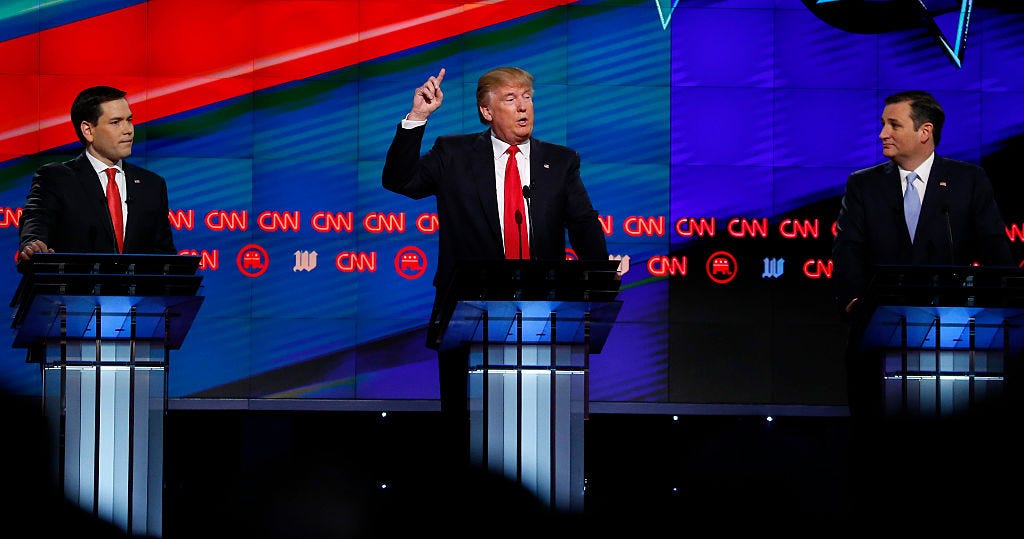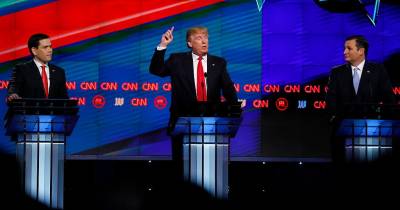The Republicans should choose a 2024 nominee who is a nationalist culture warrior who can re-engage the working-class voters who came out for Donald Trump. No, wait. Republicans should nominate a traditional conservative who can win back suburban voters. Hold on. Republicans should nominate a nationalist who also appeals to conservatives. Or is it a conservative who appeals to nationalists? Anyway, it should definitely be a woman. And not white. A dog person is a plus, but she should have at least one cat, named either Steve or Linda. We can reassess when the polling comes back.
I kid, but this kind of thinking is already driving the accelerating 2024 pre-primary. Parties have always dreamed impossible dreams of the perfect candidate, especially parties crippled by deep divisions, as the Republicans are today. Indeed, this kind of magical thinking led Democrats into a pointlessly prolonged 2020 nominating process that deepened divisions, highlighted general election liabilities and wasted more than a billion dollars.
In an era of weak parties, low entry barriers for candidates, and savage factionalism, the priority for partisan leaders should be less about picking the right person and more about picking the right process. For Republicans, that means embracing ranked-choice voting for primary elections.
Maine has already adopted the practice for both primary and general elections. Since 2018, voters there have been able to rank the candidates in order of their preference. When no one wins a majority in races with three or more candidates, it goes like this: If your top choice finishes last in the first round, he or she is eliminated and your vote rolls over to your second choice and so on until one candidate breaches the 50-percent line. Last year, Alaskans approved ranked-choice, multiparty primary elections. Candidates from all parties will run in one primary with the top two finishers after ranking, regardless of party, advancing to the general election.
I have my reservations about the tendency of this system to produce single-issue splinter parties in general elections. I have a similar worry about multiparty primaries. When we reduce the incentive for interest groups to work through the major parties, we further weaken those parties, which right now are about as strong as wet cardboard in a windstorm. Weak parties are easy to hijack and hard to use for enforcing quality-control standards. Whatever your party affiliation, if any, there’s good reason for all Americans to want two strong parties—unless you want to see a 2028 presidential election between Kim Kardashian and Chrissy Teigen and the first-ever Instagram debate.
But the argument for ranked-choice partisan primaries is pretty pure. The way to win in a crowded primary field today is very often to identify and exploit a small but devoted electoral base. To do that, you need to find a wedge issue and then hammer the hell out of it. You also need to stay on the attack against your opponents, lest your precious base is tempted to stray. Look at what Sen. Bernie Sanders was able to do to Democrats in 2016 and 2020. He shoved the party hard to the left and nurtured resentments that cost its eventual nominees votes in November. Only a mass-exodus of second-tier candidates in March of last year prevented a repeat of the debacle from four years earlier. Or think of the piteous spectacle of Republicans Sen. Ted Cruz and Gov. John Kasich playing hopscotch in the late primaries of 2016 as Republicans tried to dodge Donald Trump’s wrecking ball.
Now imagine those same scenarios with ranked-choice voting in place. Trump won the South Carolina primary with 32.5 percent of the vote, with Sen. Marco Rubio, Cruz, Kasich, former Gov. Jeb Bush, and Ben Carson splitting up 67.4 percent. While Trump would have been the second choice for some voters, it’s hard not to think that Cruz and Rubio—who were both then still presenting as conservatives—were drawing from the same pool of voters. The same goes for moderates Bush and Kasich. The incentive for attacking each other would have been strongly reduced, since candidates would have feared alienating each other’s supporters. If I want to be your second choice, I’m unlikely to say that your favorite is, say, akin to a child molester or has a teeny weenie.
The problem is even more pronounced for Republicans than Democrats, given the GOP’s longstanding preference for winner-take-all primaries. If you can win all the delegates with less than a third of the votes, something may not be working. The winner-take-all approach, like a preference for more expensive open primaries, was the product of a now-deceased Republican establishment. Decades ago, mainstream Republicans concluded that winner-take-all contests would avoid protracted primary fights and advantage well-funded, well-known candidates. Fringe candidates like Pat Buchanan and Mike Huckabee weren’t able to raise the money to buy name identification and organization in time to catch the frontrunner. Now, the rules produce the opposite results thanks to rage-click online fundraising and behemoth PAC spending.
There’s no way to know now what kind of candidate will be best for Republicans to run in three years. That will depend more on President Biden’s strengths and weaknesses than anything else. Nor do we know which of the dozens of potential GOP candidates will actually be good in real life. Remember the collapse of now-Vice President Kamala Harris or the evaporation of Sen. Rand Paul. Candidates who look good on paper often—maybe usually—disappoint. Rather than gassing up their cars for another demolition derby, party elders should take this time to push for primary reform.
Ranked choice voting is not perfect, but it creates strong incentives for what Republicans badly need: Unity and comity.







Please note that we at The Dispatch hold ourselves, our work, and our commenters to a higher standard than other places on the internet. We welcome comments that foster genuine debate or discussion—including comments critical of us or our work—but responses that include ad hominem attacks on fellow Dispatch members or are intended to stoke fear and anger may be moderated.
With your membership, you only have the ability to comment on The Morning Dispatch articles. Consider upgrading to join the conversation everywhere.